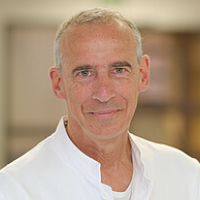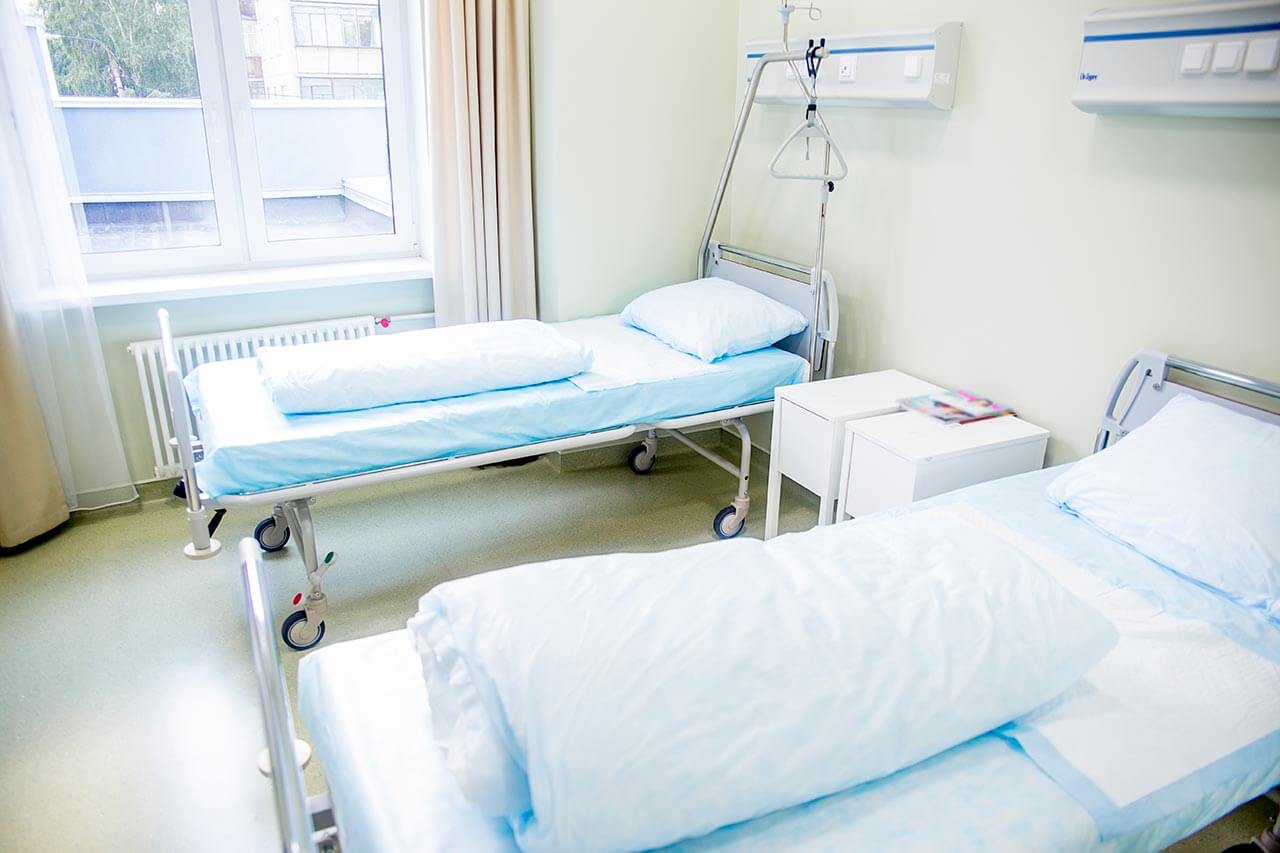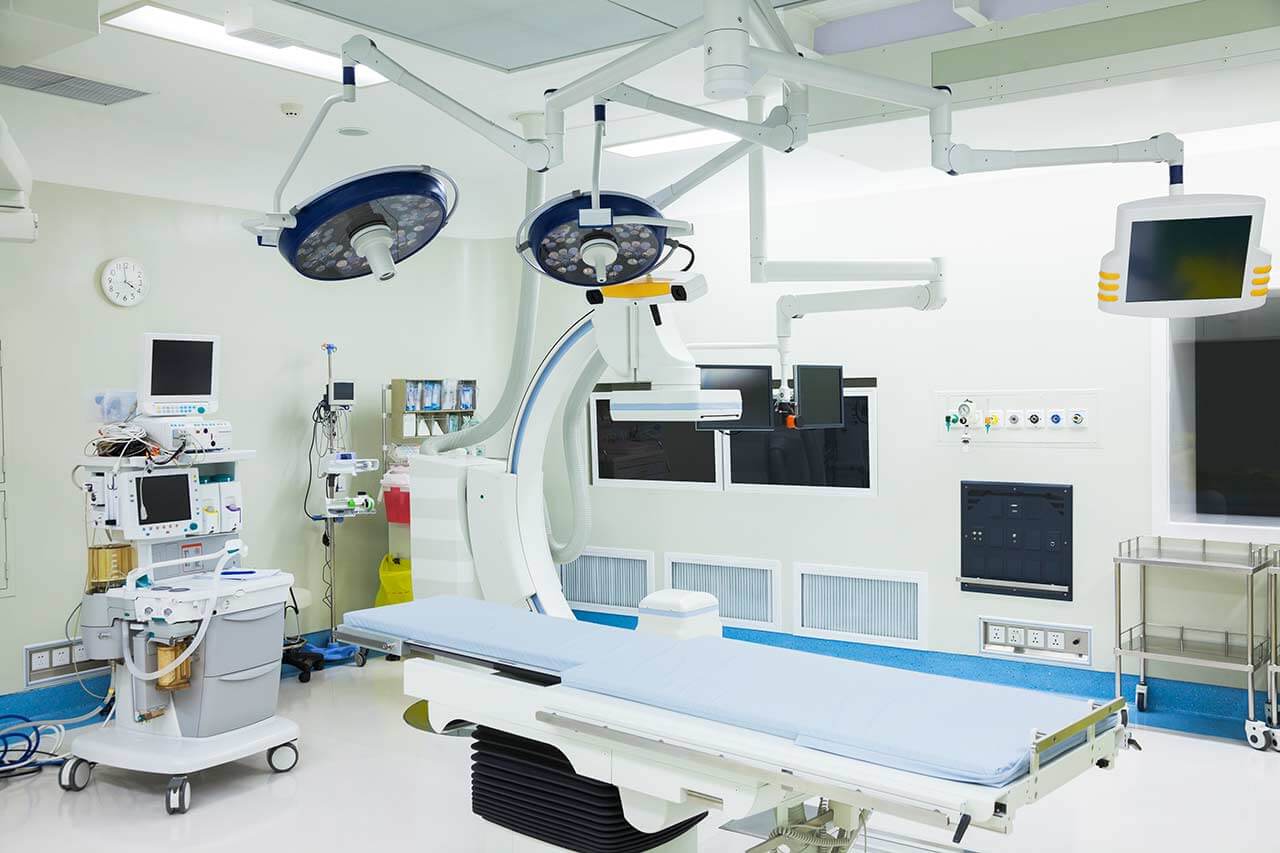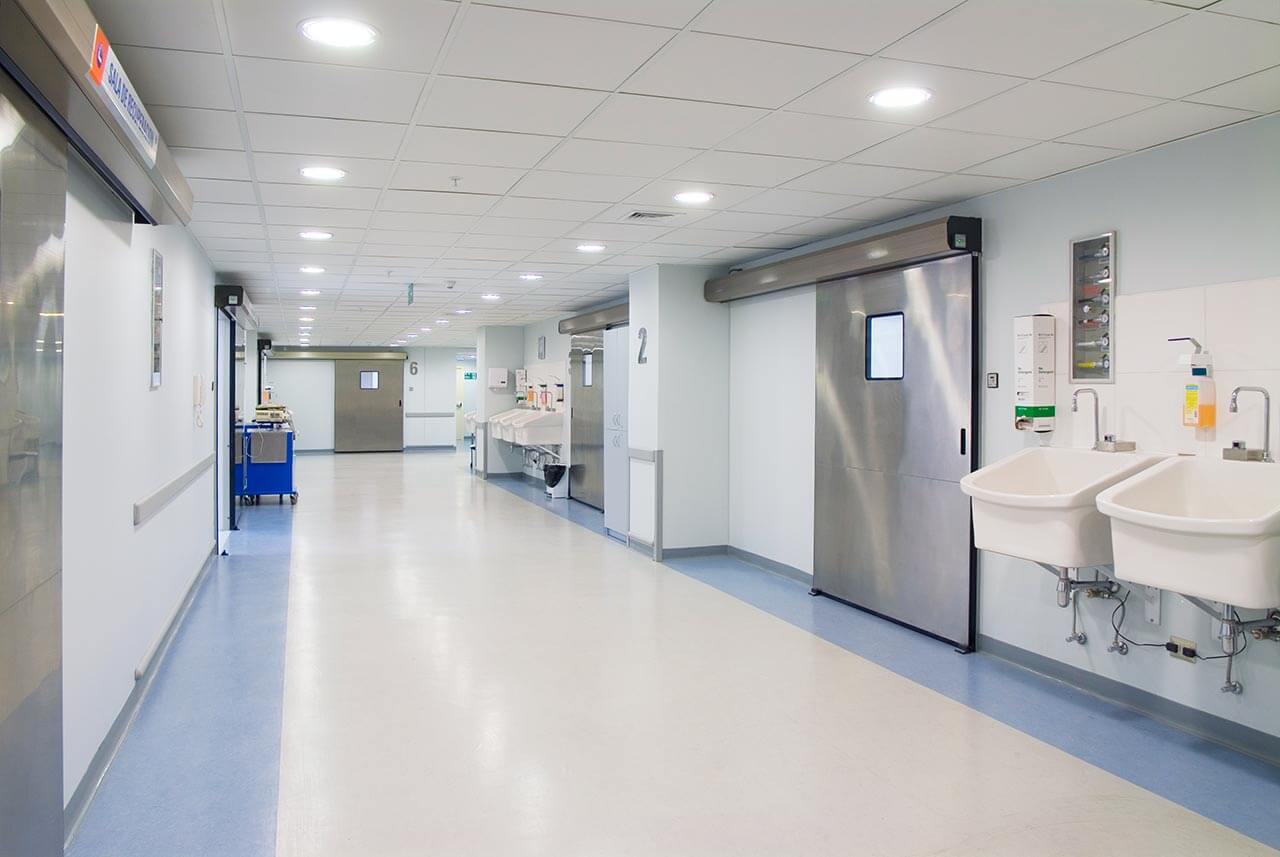
The program includes:
- Initial presentation in the clinic
- clinical history taking
- review of medical records
- physical examination
- urological examination
- laboratory tests:
- complete blood count
- general urine analysis
- biochemical analysis of blood
- inflammation indicators (CRP, ESR)
- indicators blood coagulation
- bacterial seeding analysis
- ultrasound of the urogenital system
- CT/MRI of the abdomen and pelvis
- preoperative care
- operation with subsequent skin transplantation
- debridment tissue with a vacuum pump
- histologically examination of the remote tissues
- symptomatic treatment
- control examinations
- the cost of essential medicines and materials
- nursing services
- full hospital accommodation
- explanation of future recommendations
Required documents
- Medical records
- Male genital ultrasound (if available)
- Biopsy results (if available)
Service
You may also book:
 BookingHealth Price from:
BookingHealth Price from:
About the department
The Department of Adult and Pediatric Urology at the University Hospital Oldenburg specializes in the diagnosis and treatment of diseases of the male reproductive system and pathologies of the urinary system in men and women. The medical facility treats patients of all ages, including children. The department enjoys a reputation as the largest and one of the leading centers in Germany for the surgical treatment of prostate cancer and laser treatment of benign prostatic hyperplasia (HoLEP, ThuLEP, and Greenlight Laser procedures). The department is part of the Robotic Surgery Center Oldenburg and therefore has successful experience in performing robotic surgery using the innovative da Vinci system for prostate, kidney, and bladder cancer. The medical facility has 2 operating rooms and 3 procedure rooms where more than 3,000 surgical and interventional procedures are performed every year. The department has 64 inpatient beds. The department is certified by the German Cancer Society (DKG) in the field of prostate and kidney cancer treatment. The healthcare facility has a highly qualified team of doctors who provide each patient with optimal medical care, taking into account the specifics of their clinical case.
The Head Physician of the department is Prof. Dr. med. Friedhelm Wawroschek. The specialist has over 25 years of successful clinical practice in urology. According to the Focus magazine, Prof. Wawroschek is one of the best doctors in Germany in the treatment of prostate and bladder cancer, as well as benign prostatic hyperplasia!
The department's physicians focus on the treatment of prostate cancer. This is one of the most common cancers in men. Thanks to state-of-the-art equipment and highly qualified personnel, the medical facility regularly demonstrates high treatment success rates. The department is one of the top ten prostate cancer centers in Germany. Prostate cancer responds well to treatment in the early stages, so the department's specialists recommend that men over the age of 45 undergo regular urological examinations for the purpose of prevention or early detection of oncopathology, since it is asymptomatic in the early stages. The main methods for diagnosing prostate cancer are a digital rectal exam and a PSA (prostate-specific antigen) test. If suspicious changes are detected based on the results of the preliminary diagnosis, a biopsy and imaging tests will be done. The first-line treatment for prostate cancer is most often surgery, called radical prostatectomy. The surgical procedure is performed in the department using minimally invasive or robotic techniques (da Vinci surgery). Surgical treatment is supplemented by chemotherapy, radiation therapy, hormone therapy, radionuclide therapy, and HIFU (high-intensity focused ultrasound) treatment.
The team of urologists in the department also specializes in the treatment of benign prostatic diseases, the most common of which is prostate adenoma. All modern methods of treating this pathology are available here: transurethral resection of the prostate (considered the "gold standard" in the treatment of benign prostatic hyperplasia), holmium laser enucleation (HoLEP), and Greenlight laser vaporization.
The department regularly treats women, men, and children with urinary incontinence. The range of treatments to eliminate the pathology varies from psychotherapeutic care, drug treatment, electrical stimulation therapy, and physiotherapy to various urological surgeries. One of the most common surgical procedures for treating female urinary incontinence is the TVT sling procedure. In addition, there are various surgical methods that can be used to solve individual problems of patients, such as artificial sphincter implantation or special surgical procedures to correct developmental defects in children.
The department offers excellent diagnostic and treatment options for all urologic diseases in children. The surgical spectrum in the field of pediatric urology includes all operations for the treatment of pathologies of the male reproductive system, such as phimosis, urethral malformations (hypospadias), undescended testicles, hydrocele, and many other pathological conditions. The department also has a wide range of surgical and conservative methods for the treatment of genitourinary malformations, tumors, kidney and urinary tract diseases, and urinary incontinence in children. Young patients receive medical care in both inpatient and outpatient settings.
The department's clinical focuses include the following:
- Open surgery
- Surgery on the kidneys and pelvic ureters (for example, to treat injuries, correct malformations, remove stones, or treat cancer)
- Bladder surgery (for example, to correct malformations, treat certain types of bladder cancer, or remove the entire bladder with all forms of urinary drainage)
- Prostate surgery (for example, to treat bladder emptying problems due to BPH or prostate cancer)
- Surgery on the male genitalia (for example, to correct the position of the opening of the urethra (hypospadias), to straighten the penis, to treat phimosis or undescended testicles, and all surgeries for penile cancer)
- Endoscopic surgery
- Urethral surgery (urethroscopy)
- Bladder surgery (cystoscopy)
- Ureteral surgery (ureteroscopy)
- Kidney surgery (renoscopy)
- Laparoscopic surgery
- Surgery to remove pelvic lymph nodes in prostate cancer (laparoscopic pelvic lymphadenectomy)
- Surgery to remove kidney cysts
- Surgery to remove kidneys, except for kidney cancer (laparoscopic nephrectomy)
- Surgery to remove ureteral adhesions in inflammatory diseases of the retroperitoneal tissue (Ormond's disease)
- Ureteral suturing to treat traumatic injuries
- Surgery to treat urinary incontinence
- Surgery to correct abdominal cryptorchidism (in children)
- Surgery on the seminal vesicles
- Transplantation of the ureter under the skin
- Bladder suturing in case of injuries
- Ureterectomy
- Transurethral surgery
- Transurethral resection of the prostate (TUR)
- Holmium laser enucleation of the prostate (HoLEP)
- Laser vaporization for prostate adenoma (Greenlight Laser)
- Other medical services
Curriculum vitae
Higher Education and Professional Career
- 1982 - 1989 Medical studies at the RWTH Aachen University.
- 1989 - 1994 Internship in Urology, Department of Urology, Hospital Dueren.
- 1994 - 1995 Internship in Surgery, Department of Surgery, Hospital Dueren.
- 1996 - 2004 Senior Physician, Department of Urology, Hospital Augsburg.
- Since 2004 Head Physician, Department of Adult and Pediatric Urology, University Hospital Oldenburg.
- 2004 Thesis defense, Ludwig Maximilian University of Munich.
- Since 2009 Head, Prostate Cancer Center, University Hospital Oldenburg.
Other Activities
- Examiner of the Lower Saxony Medical Association for urology, tumor drug therapy, and urine cytology.
- Author of numerous scientific publications (mainly in the field of prostate cancer).
- Reviewer of various international journals.
Photo of the doctor: (c) Klinikum Oldenburg AöR
About hospital
The University Hospital Oldenburg is a multidisciplinary medical complex offering top-notch services of the European standard. The hospital has 20 specialized departments, 15 highly specialized centers, and more than 10 institutes. The hospital provides services in almost all areas of modern medicine: general and abdominal surgery, cardiac surgery, orthopedics, traumatology, cardiology, oncology, dermatology, gastroenterology, gynecology, mammology, urology, and pediatric and adolescent medicine.
The hospital has 832 beds, and many diagnostic and therapeutic procedures are performed on an outpatient basis. More than 150,000 patients are treated here annually, 37,000 of them receive medical care in a hospital setting. The medical complex has a highly professional medical team of more than 2,900 employees and most departments are headed by professors with extensive clinical experience.
The hospital is home to one of the best comprehensive cancer centers in Germany (Nordwestdeutsches Tumorzentrum), certified according to the requirements of the German Cancer Society (DKG). The center successfully treats breast cancer, prostate cancer, colorectal cancer, pancreatic cancer, esophageal cancer, head and neck tumors, skin tumors, and other oncological diseases. The center uses modern cancer treatment methods with proven effectiveness and also offers allogeneic and autologous bone marrow transplantation for the treatment of severe hematologic diseases (European certification JACIE).
The University Hospital Oldenburg is an expert medical facility in robotic surgery. The hospital has a specialized da Vinci Surgery Center, where gastrointestinal, urological, and gynecological diseases are treated with excellence. Patients are operated on by highly qualified professors with in-depth expertise and extensive experience in robotic surgery.
The University Hospital Oldenburg is one of the leading medical institutions in Germany because it offers excellent medical and technical resources, qualified personnel, and a comfortable infrastructure designed with the needs of patients in mind. The hospital's physicians treat patients with complex clinical cases and achieve incredible results.
The basis of medical care in the hospital is humane attitude to the patient, empathy and understanding of his needs. During the therapeutic process, the patient is surrounded by care and, if necessary, receives professional psychological support.
Photo: (с) depositphotos
Accommodation in hospital
Patients rooms
The patients at the University Hospital Oldenburg stay in comfortable single, double, and triple rooms. Each patient room has an ensuite bathroom with a toilet and a shower. The patient rooms have a TV, a telephone, and Wi-Fi. The patient rooms in the pediatric departments are designed in an appropriate interior to make the young patients feel as comfortable as possible. A child can stay in the same room with one of the parents.
The hospital has an excellent infrastructure: there is a pharmacy, a hairdresser, an ATM, and a library with audio books, DVD movies, and board games.
Meals and Menus
The hospital offers delicious and balanced meals three times a day: breakfast, lunch, and dinner. Since 2022, a new menu "Vitalessen" has been introduced here, which excludes the addition of preservatives, dyes, and flavor enhancers to food. The menu takes into account all preferences and wishes of the patients.
There is also a cozy cafe in the hospital, where you can enjoy a tasty snack or a cup of aromatic coffee or hot tea with dessert.
Further details
Standard rooms include:
![]() Toilet
Toilet
![]() Shower
Shower
![]() Wi-Fi
Wi-Fi
![]() TV
TV
Religion
There is a chapel on the ground floor of the hospital where Catholic and Evangelical services are held regularly. Services by representatives of other religions are available upon request.
Accompanying person
Your accompanying person may stay with you in your patient room or at the hotel of your choice during the inpatient program.
Hotel
You may stay at the hotel of your choice during the outpatient program. Our managers will support you for selecting the best option.




